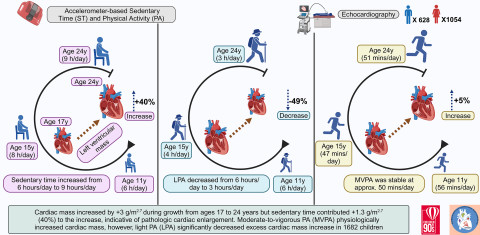The American Heart Association (AHA) has named some of the most significant developments in cardiovascular research in 2024. One of them was Andrew Agbaje's study which discovered childhood sedentariness as an independent risk factor for premature cardiac damage. The results were published in the European Journal of Preventive Cardiology in May 2024.
Referring to Agbaje’s study, AHA stated in its press release that “sedentary behavior is another major cardiovascular risk factor and a growing problem among children worldwide, who spend an average of 8 to 10 hours per day in prolonged inactivity. This secondary analysis of the Avon Longitudinal Study of Parents and Children in the UK investigated the impact of sedentary time, light-intensity physical activity, and moderate to vigorous physical activity on cardiac structure and function for 1,682 children over 13 years. They found that the longer children were sedentary, the bigger the increase in cardiac size. Overall, sedentary time contributed to an increase in body fat, inflammation, blood pressure, cholesterol, arterial stiffness and subsequent cardiac enlargement, raising the risk for cardiovascular problems later in life. Reducing sedentary behavior by engaging in light physical activity at least three hours a day lessened these impacts.”
“There is growing evidence that childhood sedentariness is a health threat that needs to be taken seriously. It should be seen as a ticking time bomb requiring prompt actions,” says Agbaje, who is an award-winning physician and associate professor (docent) of Clinical Epidemiology and Child Health at the University of Eastern Finland. He also explained the dangers of too much sedentary time in a recent video.
“This recognition would not have been possible without the extraordinary research collaboration between the University of Eastern Finland, the University of Bristol, and the University of Exeter in the UK, and the financial support of several funders. We appreciate the Children of the 90s who continue to participate in the three-decade-long study, contributing world-class data that is updating paediatric cardiovascular health sciences,” Agbaje concludes.
Agbaje’s research group (urFIT-child) is supported by research grants from Jenny and Antti Wihuri Foundation, the Finnish Cultural Foundation Central Fund, the Finnish Cultural Foundation North Savo Regional Fund, the Orion Research Foundation, the Aarne Koskelo Foundation, the Antti and Tyyne Soininen Foundation, the Paulo Foundation, the Yrjö Jahnsson Foundation, the Paavo Nurmi Foundation, the Finnish Foundation for Cardiovascular Research, Ida Montin Foundation, Eino Räsänen Fund, Matti and Vappu Maukonen Fund, Foundation for Pediatric Research, Alfred Kordelin Foundation and Novo Nordisk Foundation.
American Heart Association Press Release
For further information, please contact:
Andrew Agbaje, MD, MPH, PhD, FESC, FAHA, FNYAM, Cert. Clinical Research (Harvard), Professor (associate) of Clinical Epidemiology and Child Health, Principal Investigator (urFIT-child). Institute of Public Health and Clinical Nutrition, School of Medicine, University of Eastern Finland, Kuopio, Finland. andrew.agbaje(a)uef.fi, +358 46 896 5633
Honorary Research Fellow – Children's Health and Exercise Research Centre, Public Health and Sports Sciences Department, Faculty of Health and Life Sciences, University of Exeter, Exeter, UK. [email protected]
https://uefconnect.uef.fi/en/person/andrew.agbaje/
Webpage: urFIT-CHILD Research group
University of Eastern Finland video on the danger of sedentariness
Link to the article:
Agbaje AO. Accelerometer-based sedentary time and physical activity from childhood through young adulthood with progressive cardiac changes: a 13-year longitudinal study. Eur J Prev Cardiol. 2024 Sep 6;31(12):1480-1492. https://doi.org/10.1093/eurjpc/zwae129

A follow-up of 1682 children from ages 11 through 24 years showed that increased sedentariness from childhood through young adulthood may cause worsening premature heart damage. Image: Andrew Agbaje.
About Children of the 90s
Based at the University of Bristol, Children of the 90s, also known as the Avon Longitudinal Study of Parents and Children (ALSPAC), is a long-term health research project that enrolled more than 14,000 pregnant women in 1991 and 1992. It has been following the health and development of the parents, their children and now their grandchildren in detail ever since. It receives core funding from the Medical Research Council, the Wellcome Trust and the University of Bristol.



